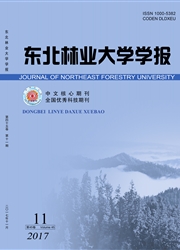

 中文摘要:
中文摘要:
通过温室控制试验,探讨生境变化对豚草生长的影响,以及与豚草入侵能力的关系;使用智能光照培养箱模拟不同海拔梯度的温度条件,探讨低温对豚草幼苗生长的影响;通过人工去叶的方式模拟天敌昆虫采食对豚草的生物控制效果。研究结果表明:豚草与丛枝菌根真菌共生增强了其适应不同土壤环境的能力。丛枝菌根真菌通过增加豚草的比叶面积,提高了豚草的资源获取能力,此作用在土壤有效氮含量低时更加明显,丛枝菌根真菌对豚草适应低氮生境有着重要意义。由于海拔升高导致环境温度降低,豚草幼苗的株高显著减少(P〈0.01),生物量在22.5-15.1℃差异显著(P〈0.01),15.1-9.4℃差异不显著,低温导致豚草幼苗生长缓慢,可能是限制豚草向北京周边高海拔地区扩散的重要环境因子之一。去叶处理对豚草的分枝数没有显著影响。去叶显著降低了豚草的生物量(P〈0.05),而在对照和碳素添加(1650 g·m-2)处理中对生物量没有显著影响。去叶后,剩余叶片的叶绿素测定值升高,豚草通过补偿生长增加了剩余叶片中的叶绿素含量以维持必需的光合作用。据此推测,由于豚草具有较强的再生能力,8月份之前如果天敌采食没有达到一定强度,则不会形成有效控制。
 英文摘要:
英文摘要:
By the green house control experiments,we studied the effects of environmental change on growth and the relation between common ragweed and invasiveness. We controlled the temperatures by using auto adjust culture chambers to simulate elevation change to learn the effects of low temperature on common weed growth,and defoliated the plant leaves to mimic the biological control effect of insect eating on common weed. The symbiosis of common ragweed with AM fungi had significant influence on the common ragweed soil nitrogen acclimation,which enhanced its resource-capture by the increase of SLA,and this influence was more significant when the soil nitrogen content was low. AM fungi played an important role in the growth of common ragweed in low-nitrogen environment. The height of common ragweed seedling was significantly decreased( P〈0.01) when the temperature dropped as altitude increased,and the total biomass was also decreased significantly when temperature dropped from 22.5 ℃ to 15.1 ℃( P〈0.01),but had no significant difference in 15.1 ℃-9.4 ℃.The low temperature made the seedlings of common ragweed grow slower,and temperature maybe be one of the important restriction factors on preventing the common ragweed to spread to areas at higher altitudes around Beijing. Defoliation had no significant influence on the branch number of common ragweed. It decreased the total biomass significantly( P 0.05)under nitrogen addition treatment( 30 g·m-2),but had no significant effects under local control or carbon addition( 1 650g·m-2). The strong regeneration ability of common ragweed could weaken the control effect of natural enemy if they did not eat enough leaves until August.
 同期刊论文项目
同期刊论文项目
 同项目期刊论文
同项目期刊论文
 期刊信息
期刊信息
